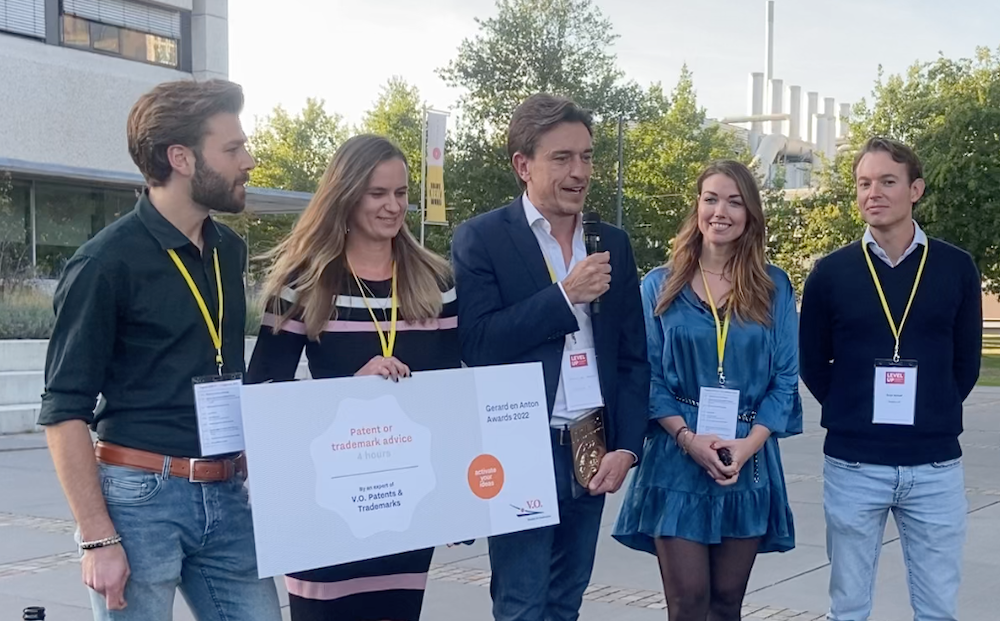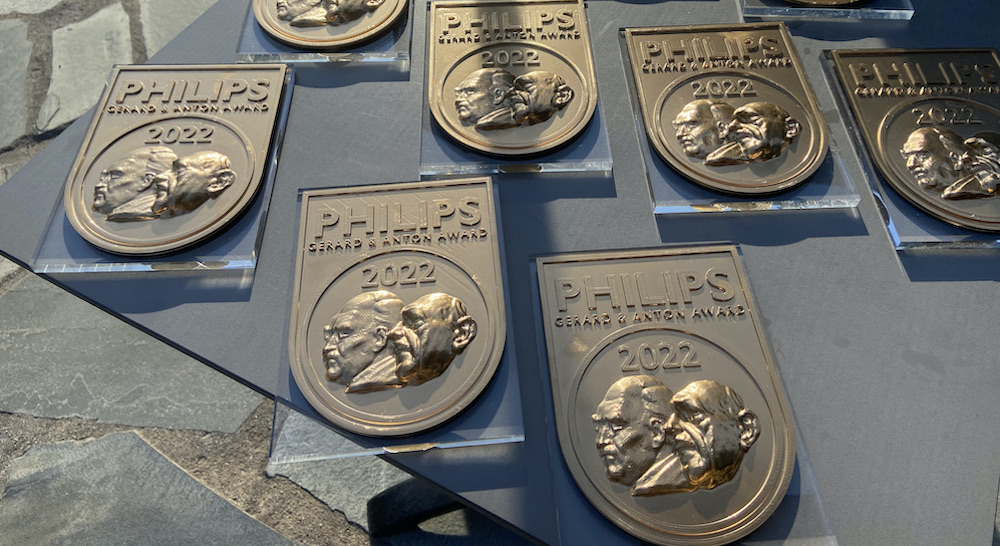(Editor’s note: This installment of the Eindhoven Business Briefing is part of our Tech Tuesday series. Dispatches Europe tracks the tech scene – startups, scale-ups and mature companies – in our headquarters city of Eindhoven because so many of our highly skilled internationals are engineers, physicists and developers.)
We love it when a plan comes together. Way back in 2016, we heard Guus Frericks, founder of HighTechXL, say that Eindhoven had to develop a new generation of advanced tech firms so it wouldn’t be vulnerable to the kind of economic collapse that hit the city in 1997 when Philips left town for Amsterdam.
Six years later, Frericks has a new 100 million euro DeepTechXL investment fund, and the startup/tech ecosystem is booming as we saw during two events 22 September on High Tech Campus Eindhoven.
The first event was an all-day program, Level Up, at the campus Conference Center, sponsored by economic development agency Brainport’s The Gate initiative. (The Gate, a new program based at Technical University of Eindhoven, assists early stage startups, especially student teams.) The second event was the Gerard & Anton Awards for startups, which you can read about below.

The Level Up event included workshops, networking and presentations. But we wanted to see the “Not Your Usual Dragon’s Den” event. Moderator Annimiek Bies, Brainport program marketing manager, turned the tables on a stage full of investors and asked them to pitch, detailing their investment motivation and what they’re looking for in startups.
It’s not every day you get to hear a stage full of investors reveal their insights including the most important characteristics they look for in startup teams and the likelihood a founder makes a good CEO.
Let’s start with Frericks, who is never shy about speaking his mind:
Guus Frericks, founder of DeepTechXL and a serial entrepreneur:
Coachability and stamina are key to building a successful deep-tech startup … but it’s more than that, Frericks said. “You know, are we going to go to hell and back 15 times? And by the way, how’s your private situation to go to hell and back at least 15 times? Also, you need to make a judgement – is there enough trust in each other to go on this journey, and even figure out a way to enjoy the ride?”
Just because you’re a founder doesn’t mean you should be the CEO, Frericks noted. “I hate to say it, but when there is a CEO who happens to develop the technology and we don’t see the skills – the CEO skills – we’ve just said, ‘You know, it’s not gonna happen.’ Either you accept that or you don’t.”
DeepTechXL values team diversity: “It’s not just men and women. It’s age. it’s personalities. It’s backgrounds.” Frericks looks for “a melting pot” of gender, age and experiences. That brings more perspective to the project.
Andy Lürling, founding partner of LUMO Labs, a venture capital fund and venture builder and a serial entrepreneur:
LUMO Labs invests in the very early stages. Lürling said he finds the people who “shout the hardest” at the beginning that they are the CEO are likely not to be CEO at the end. “It’s very important, in my view, to say, ‘Okay, you have this role as a CEO, this is a daily job, and you are struggling. You’re a shareholder, but being a shareholder and CEO are two different things. And they can conflict sometimes.” Sometimes, they realize that in the interests of the company, it’s better that someone else takes the CEO role.
Gert-Jan Vaessen, executive with economic development agency BOM and manager of Brabant Ventures, with about 400 million euros under management:
Vaessen said it’s very tough for Brabant Ventures to recognize who’s the right person for each stage of business and growth. “And especially in the early stage, companies go through a lot of phases and sometimes very fast. It’s very tough to recognize if you are the right person in the right spot.”
Brabant Ventures encourages diversity not just from the gender perspective, but from the perspective of skills and outlook, he said.
Simone Brummelhuis, Borski Fund partner and entrepreneur. Borski Fund requires a woman on the team with equity:
Borski Fund has a particular approach that calls for “team scans that are quite harsh,” Brummelhuis said. That involves bringing in a third party to push the teams hard to see if they stay together under pressure.
One of the problems she sees is that while enterprise teams usually have more skills, including sales and marketing, deep-tech teams tend to be too technical. Borski often has to add people with commercial experience to deep-tech startups.
A startup veteran, Brummelhuis pointed out that with her first company, a booking platform for restaurants, no one thought they needed it because they could just pick up the phone. “Sometimes when you’re not sure, it turns out to be your best investment. And we think you should make more investments like that.”
Sander Verbrugge, Innovation Industries, a deep-tech capital fund:
Deep-tech teams typically are “molded” around their technology, Verbrugge said. As teams grow, they need to start building operations and bolster commercial teams. The key element for Innovation Industries is that teams are open to strengthening the team in crucial areas beyond the technology and are coachable. Innovation Industries also looks for CEOs “who know they’re at the beginning of a marathon” and have the flexibility to adapt as the company grows, Verbrugge said.
Bob Duisters, Sioux Tech Fund:
Sioux (pronounced “See-YOUKS”) is looking for early-stage startups so they can play a strategic role in their development. Like Innovation Industries, Sioux is looking for teams that can accept that different leadership often is needed at different stages of development. The CEO at the beginning might not be the right person at later stages, Duisters said. “It’s a different competence and a team needs to be able to adapt them when needed.”
Hans Bloemen – ECFG:
The most important consideration for ECFG is whether team members have the energy and power to “go for it,” to “break through the brick walls and obstacles” that will surely come and push through for at least three years.

Gerard & Anton Awards
Immediately following the Brainport event, everyone moved to the Campus lakefront from the conference center for the annual Philips Gerard & Anton awards presentation. The awards recognized 10 emerging startups, including at least two that have raised serious funding. While the event was in Dutch, we understood enough to realize there are several startup teams from TU/e we all need to know about.
• Ambagon Therapeutics, a TU/e spinout which raised 75 million euros earlier this year for their cancer-treatment technology. The startup is based both in Eindhoven and in San Francisco. Ambagon uses technology developed by biochemist Eline Sijbesma. Sijbesma’s “molecular glue” is a drug that makes it possible to better control disease-causing proteins. The CEO is American pharma veteran Scott Clarke.
• Cellcius, a startup that has raised 1.5 million euros for their heat battery technology that makes it possible to heat without emissions, potentially reducing CO2.
• InnoSIGN has developed mRNA-based tests that measure the activity of signal transduction pathways in cancer and immune cells, according to their website. The goal is to use the technology to predict how patients will respond to specific drugs. InnoSIGN raised $1.2 million this past August in an A-round.
Award winners we know included:
• inPhocal, a HighTechXL alumnus that uses proprietary laser technology to print on any surface, replacing ink-jet printing.
• Axelera AI, which just released its first chip, the Thetis Core. This new hardware and software platform will concentrate the AI computational power of an entire server into a single chip, a single chip with far lower power consumption and price than current AI hardware. Axelera is based at the AI Innovation Center on High Tech Campus Eindhoven. Axelera has raised about $12 million as of summer, 2022.
• Autoscriber, a LUMO Labs startup that’s adapting AI technology for medical records. Clinicians use the software to record and process doctor/patient interaction, reducing the administrative load of physicians.
The winners were selected by an independent jury from more than 50 nominations, according to moderator Bert-Jan Woertman.
Cha-ching
Speaking of investments, multiple Eindhoven-based startups received major investments last week including:
• inPhocal. The team received 2 million euros, including 1.5 million euros from lead investor DeepTechXL, founded by Guus Frericks, BOM and other investors.
• Alphabeats, which has been through both HighTechXL and LUMO Labs accelerators. Alphabeats received 1.5 million in a third round of funding led by DeepTechXL, with a follow-on investment by LUMO Labs. Alphabeats uses technology developed by Philips to decrease stress.
Dutch Rose Media
We see the most interesting companies because our marcom division works with clients.
One of the most gee-whiz companies we’ve seen lately is Dutch Rose Media/4DR in the Strijp-S section of Eindhoven. TU/e graduate Natasja Paulssen has created an augmented reality technology that uses volumetric capture. Multiple cameras in a huge studio create 3D images that are like nothing you’ve ever seen. Paulssen says unlike other tech companies, she has no trouble finding talent because people hear about what’s she’s doing and come to her. So do clients, and when we were there, she was preparing to do a project for local soccer team PSV.
Dutch Rose Media’s technology has so many applications, including fashion and arts. But Paulssen believes corporate training ultimately will be her major revenue generator. And it’s not just that she’s built an impressive company, it’s that she’s fearless.
Her mantra is, “I’ve never done it before, so I think I can do it.”
We’ll have a more detailed post later.














